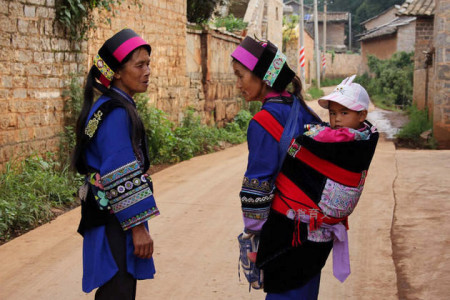

(Sani people)
Mizhi festival, exclusive to the Sani ethnic branch of the Yi people, usually lasts three to seven days. However, the date of Mizhi festival differs. For the Sani, Black, and Ahwu branches of the Yi people who live around the Stone Forest, it is normally spent on lunar 2 February; but lunar October for the Yi people who live in the mountainous areas.
In the hearts of the Sani people, Mizhi Forest, also called "sacred forest", is the holy place where any living being is inviolable.
When the Mizhi festival is due, all the men of a Sani ethnic village will rally to select the Mizhiweng or the head responsible for presiding over the festival, and to pick out eligible men to take part in the sacrifice offering ceremony for the Mizhi God. Women are required to stay indoors during the festival.
What is needed for the ceremony is a white goat (sheep), a white rooster and a white pig; and when the day comes, the Mizhiweng will set assignments for all the participants.
Abiding by the conventions passed down for a long time, the Bimo (Yi ethnic priest) will be accompanied by some eligible men to access to the Mizhi Forest and find the Holy Mizhi Tree. They will piteously lift the Mizhi God--which is enshrined every year under the Tree--into the basket cushioned with pine needles. After the ceremony is carried out in the forest, the Mizhi God will be taken to the home of the priest to be "bathed" and redressed, and taken back to the forest next day.
During the seven-day festival, the priest will lead all the men to tour in the village, speaking aloud in order to blame misbehaviours in the village.
The Mizhi God is believed to live in the holy Mizhi Forest, safeguarding the Sani people, though there circulates different versions of folklores for the festival.
You will only receive emails that you permitted upon submission and your email address will never be shared with any third parties without your express permission.
